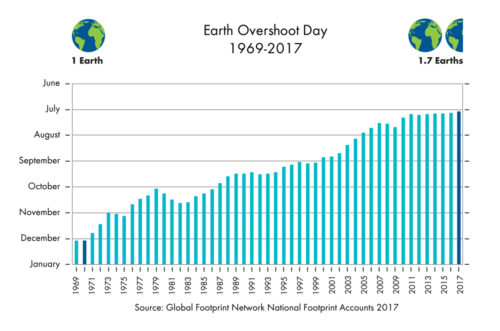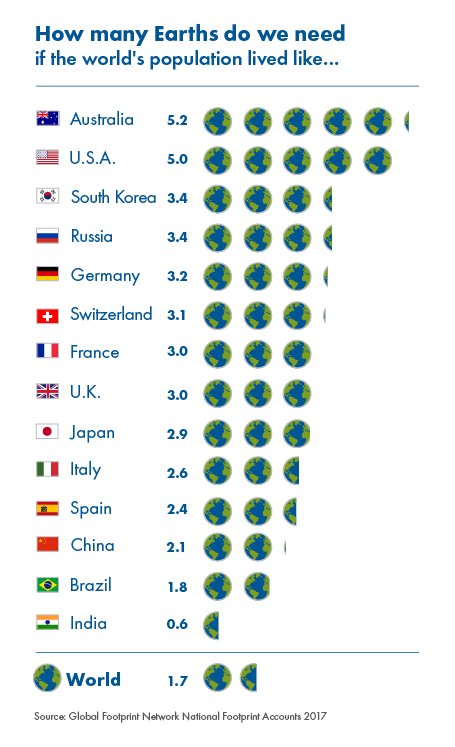Today is Earth Overshoot Day, which means that humanity has already used up all the Earth’s available resources for this year ~ a massive five months too early.
 Each year Earth Overshoot Day is calculated by Global Footprint Network as the day when the amount of the Earth’s resources consumed since the beginning of the year will exceed what the Earth can replenish within that year.
Each year Earth Overshoot Day is calculated by Global Footprint Network as the day when the amount of the Earth’s resources consumed since the beginning of the year will exceed what the Earth can replenish within that year.
In 1969, Earth Overshoot Day fell on December the 21st, meaning that humanity only overshot the Earth’s capacity to meet our demand for resources by ten days, in comparison with the 5 months of overshoot this year.
 Earth Overshoot Day is computed by dividing the planet’s biocapacity (the amount of ecological resources Earth is able to generate that year) by humanity’s Ecological Footprint (humanity’s demand for that year), and multiplying by 365, the number of days in the year).
Earth Overshoot Day is computed by dividing the planet’s biocapacity (the amount of ecological resources Earth is able to generate that year) by humanity’s Ecological Footprint (humanity’s demand for that year), and multiplying by 365, the number of days in the year).
The date is calculated using the most up to date UN statistics and all the data and calculations are re-calibrated each year to ensure that the dates are truly comparable.
To calculate biocapacity the calculations take into account each nation’s biologically productive land and sea area, including forest lands, grazing lands, cropland, fishing grounds, and built-up land.
Ecological Footprint measures a population’s demand for plant-based food and fiber products, livestock and fish products, timber and other forest products, space for urban infrastructure, and forest to absorb its carbon dioxide emissions from fossil fuels.
Unfortunately, in the breakdown of ecological footprint country by country, Australia does not perform well.
Footprint Network’s calculations show that it would take 5.2 earths to sustain the entire human population if they lived an Australian lifestyle.

“We emit more carbon dioxide into the atmosphere than our oceans and forests can absorb, and we deplete fisheries and harvest forests more quickly than they can reproduce and regrow.”
The Earth Overshoot Day website offers a range of ideas and initiatives to help people move towards living within the limits of the one Earth we actually have.
Their #movethedate campaign promotes ideas for moving the date back towards the end of the year, such as reducing food waste, reaching out to city leaders and swapping your solo car commute for a more sustainable and social alternative.
You can also check out Starfish’s newsfeed for inspiring stories of change for rural and remote sustainability, our work included.